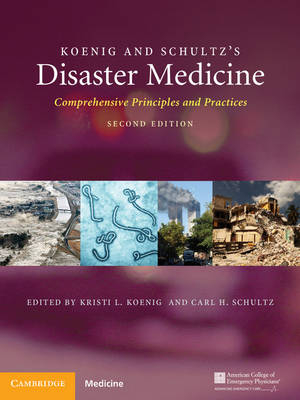
Koenig and Schultz's Disaster Medicine
Cambridge University Press (Verlag)
978-1-107-04075-5 (ISBN)
As societies become more complex and interconnected, the global risk for catastrophic disasters is increasing. Demand for expertise to mitigate the human suffering and damage these events cause is also high. A new field of disaster medicine is emerging, offering innovative approaches to optimize disaster management. Much of the information needed to create the foundation for this growing specialty is not objectively described or is scattered among multiple different sources. This definitive work brings together a coherent and comprehensive collection of scientific observations and evidence-based recommendations with expert contributors from around the globe. This book identifies essential subject matter, clarifies nomenclature, and outlines necessary areas of proficiency for healthcare professionals handling mass casualty crises. It also describes in-depth strategies for the rapid diagnosis and treatment of victims suffering from blast injuries or exposure to chemical, biological, and radiological agents.
Dr Kristi L. Koenig, Professor of Emergency Medicine and Public Health, and Director of Public Health Preparedness at the University of California, Irvine, is an internationally recognized expert in the fields of homeland security, disaster and emergency medicine, emergency management, and emergency medical services. She holds multiple appointments including visiting professor at universities in Australia, Italy, and Belgium. With a strong health policy and academic background, including more than 100 peer-reviewed publications and nearly 500 invited lectures in about thirty-five countries, she is widely sought after for presentations at regional, national, and international forums. Dr Carl H. Schultz is a Professor of Emergency Medicine and the Director of Research at the Center for Disaster Medical Sciences, University of California, Irvine School of Medicine. He is an internationally recognized expert and researcher in the fields of disaster and emergency medicine. He has over 100 peer-reviewed publications. He chaired the Disaster Preparedness and Response Committee of the American College of Emergency Physicians and has served as a consultant for the US Department of Defense, the Joint Commission, and the State of Israel. Dr Schultz holds faculty appointments at universities in Belgium and Italy.
Part I. Conceptual Framework and Strategic Overview: 1. Disaster research and epidemiology Megumi Kano, Michele M. Wood, Judith M. Siegel and Linda B. Bourque; 2. Disaster education and training: linking individual and organizational learning and performance Peter W. Brewster; 3. Surge capacity and scarce resource allocation Donna F. Barbisch; 4. Climate change Richard A. Matthew and Jamie L. Agius; 5. International perspectives on disaster management Jean Luc Poncelet; 6. Community resilience Rose L. Pfefferbaum, Richard Reed and Betty Pfefferbaum; 7. Ethical issues in disaster medicine George J. Annas; 8. Emerging infectious diseases: concepts in preparing for and responding to the next microbial threat Shantini D. Gamage, Stephen M. Kralovic and Gary A. Roselle; 9. Disaster behavioral health James C. West, Merritt D. Schreiber, David Benedek and Dori B. Reissman; 10. Populations with functional or access needs Brenda D. Phillips and Laura M. Stough; Part II. Operational Issues: 11. Public health and emergency management systems Connie J. Boatright-Royster and Peter W. Brewster; 12. Legislative authorities and regulatory issues Ernest B. Abbott and Jeffrey H. Luk; 13. Syndromic surveillance Gary A. Roselle; 14. Triage Christopher A. Kahn, E. Brooke Lerner and David C. Cone; 15. Personal protective equipment Howard W. Levitin; 16. Decontamination Howard W. Levitin and Christopher A. Kahn; 17. Quarantine James G. Hodge, Jr and Lawrence O. Gostin; 18. Mass dispensing of medical countermeasures Susan E. Gorman; 19. Management of mass gatherings Michael S. Molloy; 20. Transportation disasters Ulf Björnstig and Rebecca Forsberg; 21. Emergency medical services scene management Kenneth T. Miller; 22. Healthcare facility disaster management John D. Hoyle, Sr; 23. Mass fatality management Paul S. Sledzik and Sharon W. Bryson; 24. Rehabilitation of disaster casualties James E. Gosney, Jr and Colleen O'Connell; 25. Crisis and emergency risk communication Barbara J. Reynolds and Gilead Shenhar; 26. Telemedicine and telehealth role in public health emergencies Adam W. Darkins; 27. Complex public health emergencies Frederick M. Burkle, Jr; 28. Patient identification and tracking Andreas Ziegler; 29. Explosive events Glenn D. Burns and John M. Wightman; Part III: Section 1. Clinical Management: CBRNE and Hazmat: 30. Burn event management Tina L. Palmieri, Ariel Tessone and Josef Haik; 31. Clinical aspects of large-scale chemical events Jonathan Newmark; 32. Biological events Zygmunt F. Dembek and Theodore J. Cieslak; 33. Nuclear and radiological events Richard J. Hatchett, David M. Weinstock and Ronald E. Goans; 34. Hazardous material, toxic, and industrial events Hoon Chin Lim and Hock Heng Tan; Section 2. Clinical Management: Environmental Events: 35. Floods Mark E. Keim; 36. Cyclones, hurricanes, and typhoons Kelly R. Klein and Frank Fuh-Yuan Shih; 37. Tornadoes Arthur G. Wallace, Jr; 38. Earthquakes Carl H. Schultz and Shira A. Schlesinger; 39. Tsunamis Samuel J. Stratton; 40. Winter storms and hazards John M. Wightman and William H. Dice; 41. Extreme heat events Carl Adrianopoli and Irving Jacoby; 42. Landslides Iain T. R. Kennedy, David N. Petley and Virginia Murray; 43. Volcanoes Peter J. Baxter.
| Erscheint lt. Verlag | 18.4.2016 |
|---|---|
| Zusatzinfo | 144 Tables, color; 77 Halftones, color; 95 Line drawings, color |
| Verlagsort | Cambridge |
| Sprache | englisch |
| Maße | 223 x 286 mm |
| Gewicht | 2350 g |
| Themenwelt | Medizin / Pharmazie ► Medizinische Fachgebiete ► Notfallmedizin |
| ISBN-10 | 1-107-04075-2 / 1107040752 |
| ISBN-13 | 978-1-107-04075-5 / 9781107040755 |
| Zustand | Neuware |
| Informationen gemäß Produktsicherheitsverordnung (GPSR) | |
| Haben Sie eine Frage zum Produkt? |
aus dem Bereich


